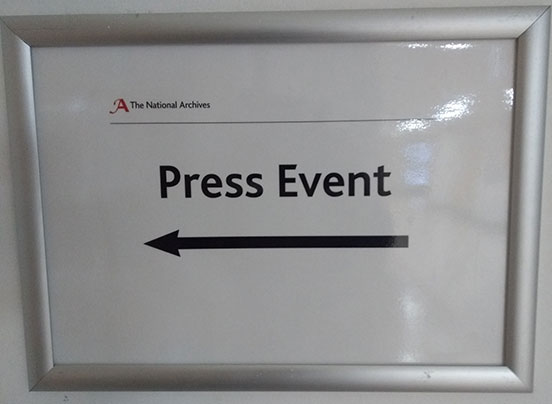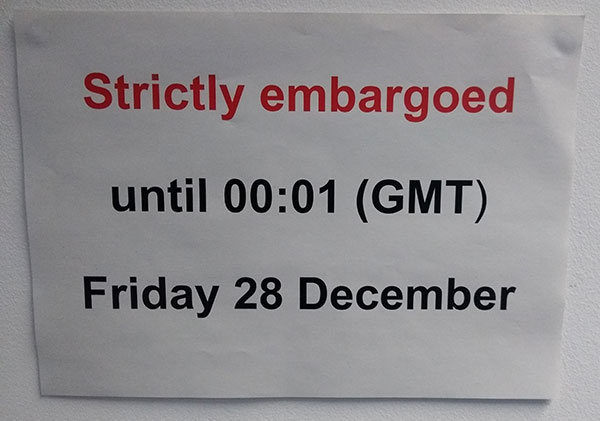Today sees the release of government records from the Prime Minister’s Office and the Cabinet Office relating to the year 1994. This is the culmination of weeks of work for many staff here at The National Archives.
Colleagues from our Government Audience directorate liaised with colleagues in the Cabinet Office in September to pull together the list of files that will be transferred to Kew to be opened in the reading rooms for the general public at the end of the year. Staff in the Cabinet Office have already been working on the files for a number of months. First, they go through the files for the year and select the ones that are historically valuable so that these can be preserved at The National Archives. Before these are sent to Kew, they are reviewed to make sure that they do not reveal any sensitive information and then placed in special boxes that provide protection against both heat and water damage, ensuring that the records remain usable for years to come.
Once at Kew, a team will check the physical files against the file references on the list to ensure that all files on the list are actually here. If necessary, colleagues from our Collection Care department will also have a look at the files to ensure they are physically able to be ordered and viewed, repairing any damage to the paper itself.

A sign directing journalists to our press event
For each release of these files, the Media team facilitate a press event where invited members of the press are given advance access to view the files under embargo so that they are able to write about the files and publish their articles on the day the files are first available in our reading rooms. We do this so that people who are interested in the files have ‘signposts’ to the variety of topics that are covered in the files.
The media team and colleagues from our Collections Expertise and Engagement team look at the file list and choose around 10% of the files to read – this allows us to provide journalists with a press pack which is their ‘signpost’ to the files we have and the issues they cover. Staff also read the files under embargo, but for them this means reading them in secure conditions in our repositories. The temperature in our repositories is set for paper records and not for people, so a thick cardigan is advisable if you spend any time there.

Journalists view the files under strict embargo – no stories can be published until the files are made available in our reading rooms
Our press event runs for two days and we have approximately 35 journalists on site each day. I think it’s safe to say that nowhere else in government will media teams have this level of interaction with members of the media; however, as the UK Government archive, we are the one place where they can view government records – and, as we give them advance access, they can guarantee their editors news stories during a traditionally quiet news week. History really does become news!
While the press event is managed by the Media team, there are many colleagues from across the organisation who work with us to make this event happen. Colleagues from our Record Copying and Digitisation teams digitise and quality-assure some of the records for us, while colleagues in Digital Services build a password-protected press event website for the media and upload the files. Colleagues in the Access, Catalogue and Taxonomy team and Digital Services ensure that the catalogue entries are correct, in the right format and are uploaded to our online catalogue, Discovery, ready for the embargo lifting.

Our conference corridor is set up as a mini reading room for the press event, and reading room rules apply
Colleagues from Document Services work with us during the press event as they staff the ordering point and bring the records from the repository to the conference room corridor. For them, the first hour or so of each day is very busy as journalists work out the files they want to order.
For the duration of the press event, the conference corridor is set up like a mini reading room and the rules that apply in the main reading rooms on the first and second floors also apply in the conference corridor. The fact we have original records which are two weeks away from being opened to the public is the reason why we have to close the corridor to everyone apart from staff working the event and the invited members of the media. The security of documents is a high priority for us.
Currently, we have two of these high profile press events each year with the Cabinet Office; while it is the Media team who facilitate the actual day, we could not do this without the help of many colleagues across the organisation.
Another interesting post. It’s just a pity that many files that can not ‘guarantee… news stories during a traditionally quiet news week’ taken so long to be ‘dripped’ – released is too strong a word – into the public domain. This is despite assurances about shortening the time period before files are accessible by the general public.
Where are these papers – no link, why not?: UK-Russian relations (PREM 19/4420-4422)
Also, where are the letters from the FCO regarding Crimea??? Your search function is a mess, couldn’t find it on your site. VERY unhelpful.
Dear Ralph,
Thanks for your comment.
Not all of the files included in this latest release have been digitised. Where we have included links in our news item (http://www.nationalarchives.gov.uk/about/news/prime-ministers-papers-from-1994-released/prime-ministers-office-files-prem-1994/), these files are currently available online to download.
Those files which have not been digitised are available to view in our reading rooms at Kew. If you are unable to travel here, you can also request copies to be made of files which have not already been digitised: http://www.nationalarchives.gov.uk/help-with-your-research/record-copying/
This release included files from the Prime Minister’s Office and the Cabinet Office. If you are interested in Foreign Office correspondence, you may find our research guide to Foreign Office and Foreign and Commonwealth Office correspondence 1920 onwards useful: http://www.nationalarchives.gov.uk/help-with-your-research/research-guides/foreign-office-and-foreign-and-commonwealth-office-correspondence-1920-onwards/
Our guides provide advice on the records we hold and how you can search for them using the catalogue: http://discovery.nationalarchives.gov.uk/ You can search our catalogue using keywords and dates to see what is held here and at over 2,500 other archives across the UK. For advice on searching effectively, read Discovery help: http://www.nationalarchives.gov.uk/help-with-your-research/discovery-help/
Kind regards,
Liz.